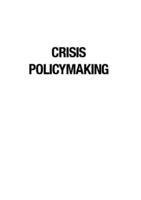Crisis Policymaking: Australia and the East Timor Crisis of 1999
Abstract
East Timor’s violent transition to independence, which began early in 1999, presented the Australian Government with a significant foreign policy crisis. This crisis was not sudden, totally unexpected or ultimately threatening to Australia’s survival. But the crisis consumed the attention of Australian leaders, saw significant national and international resources employed, and led to the largest operational deployment for the Australian Defence Force since the Vietnam War. This crisis also created a significant rupture in the hitherto carefully-managed relationships between Australia and its important neighbor, Indonesia. The events of September 1999 ultimately led to the birth of a new nation and the deaths of many people who might have otherwise expected to enjoy that independence. In this major study, David Connery examines how the Australian Government—at the political and bureaucratic levels—developed and managed national security policy in the face of this crisis. The events, and the policymaking processes that both led and followed, are reconstructed using sixty interviews with key participants. This study identifies certain characteristics of crisis policymaking in Australia that include a dominant executive, secrecy, external actors and complexity.
Keywords
politics and goverment; east timor; australia; foreign relations; Canberra; Department of Foreign Affairs and Trade (Australia); Government of Australia; Indonesia; International Force East Timor; United NationsDOI
10.26530/OAPEN_458922OCN
646089701Publisher
ANU PressPublisher website
https://press.anu.edu.au/Publication date and place
Canberra, 2010Classification
Politics and government


 Download
Download Web Shop
Web Shop